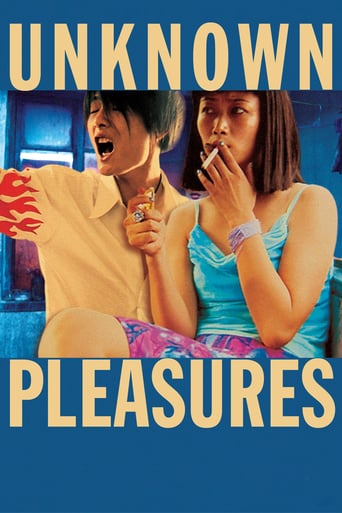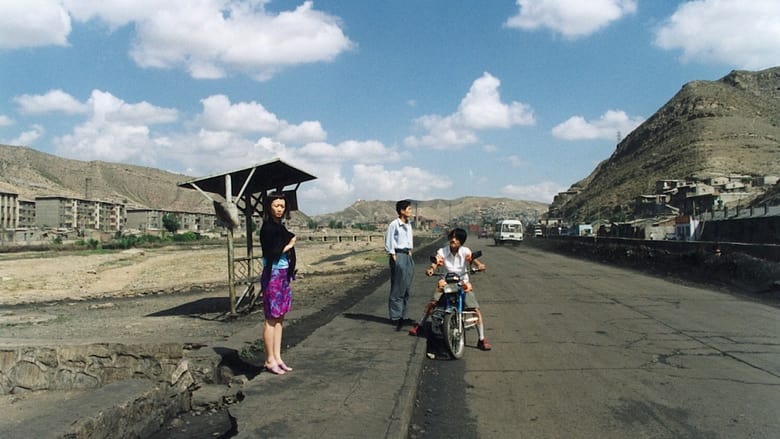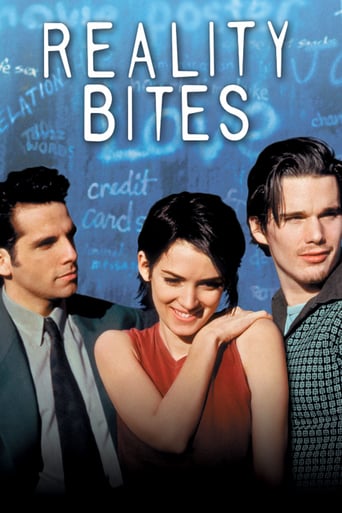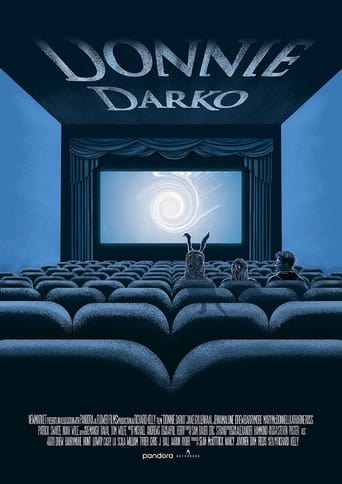

Unknown Pleasures (2002)
Three disaffected youths live in Datong in 2001, part of the new "Birth Control" generation. Fed on a steady diet of popular culture, both Western and Chinese, the characters of Unknown Pleasures represent a new breed in the People's Republic of China, one detached from reality through the screen of media and the internet.
Watch Trailer
Cast


Similar titles
Reviews
Good movie, but best of all time? Hardly . . .
Not sure how, but this is easily one of the best movies all summer. Multiple levels of funny, never takes itself seriously, super colorful, and creative.
Blistering performances.
An old-fashioned movie made with new-fashioned finesse.
Jia Zhang-ke's movie is powerful and sad. It concerns what you might call two young semi-urban hicks with no future, both rail-thin, constantly smoking, one Bin Bin (Zhao Wei Wei), tall and sad-faced, the other, Xiao Ji (Wu Qiong), a smaller guy with a stylish haircut that covers a lot of his face. The former has a girlfriend, but he and she agree to separate while she goes through exams. Then she reproaches him for not asking how she did, but he protests that he's out of the loop so didn't know when she was done. His mother, a Falun Gong sympathizer, says he's useless and he offers to enter the army. But when he has a blood test, it shows he has hepatitis and he's ineligible for military service. The orderly warns him about contact with a girl because it's very contagious. It seems like his life is over.Neither guy has a job and they have no money. Xiao Ji, the smaller, more rakish one, who is all bravado and no follow-through, practically stalks a girl named Qiao Qiao (Zhao Tao) who's an entertainer for a drink company and who has a petty gangster for a boyfriend. This older punk eventually has Xiao roughed up at a disco for dancing with his girlfriend, and turns out to carry a gun. The girl at first rejects the boy, but then they go together and even sleep together.After he learns he has hepatitis Bin Bin borrows money from a shyster and gives his girlfriend an expensive present in a very sad scene where he won't touch her and she leaves him sitting by himself inertly in a typically desolate train station.Both the pals have dead-end lives. Sometimes the Chinese landscape, a vast rural-turning-into-urban wasteland under construction, reminds one of Italian neo-realism and the poverty of postwar European cities and one may be reminded of Pasolini's 1961 first film about young toughs with nothing to do, Accattone, but these Chinese boys are more passive and inarticulate and lack the Italians' false bravado.Bin Bin starts selling discs to make back the money he owes but that looks hopeless and Xiao Ji's motorbike is starting to break down. Finally they decide to rob a bank. Naturally such a demanding project undertaken by two individuals of such low energy and flair is a complete flop, and the tall boy is arrested while the punk-haired one flees on the bike, but he has to leave it by the side of a desolate highway and hitch a ride in a van.Bin Bin, in jail, is forced to sing a song and he sings a hopeful song about working class people he sang with his girlfriend in front of the TV at a happier moment. The film ends here, with the voice-over of the boy and girlfriend singing over the final credits.The ironically named "Unknown Pleasures" is an infinitely sad, unpredictable, seemingly aimless, but ultimately very meaningful and awesome movie that is at once primitive, real, and deeply touching. This is a great movie. It takes you somewhere you've never been before, somewhere painful and unforgettable. You can say this is a "depiction of the spiritual malaise afflicting Chinese youth as a result of global capitalism" as Howard Schumann has done, but that is to articulate the thing in a way that the participants in the story could not do. Rather, it is a couple of aimless lives awash in a changing modern China pretty near to the bottom of the social scale; but it is also a picture of lack of chutzpah, helplessness, failure to thrive. TV's, always on in some room, show events in and out of China, new construction, criminal prosecutions, a downed US plane, Beijing chosen for the Olympics, and there is talk of dollars and video games and even Pulp Fiction's opening scene, but all this is little more than a noisy distraction for the aimless boys. The young people in Hou Hsiao Hsien's 2001 Millennium Mambo are rather different. They are all good looking hustlers, and they may go nowhere either but they're going to make some kind of splash and spend some money along the way. But while Hou's film seems on the outside looking in cluelessly, Jia enters to the core of his characters' grim shallow lives and etches them on our hearts forever. Jia creeps up on you slowly and then never lets you go. This is the most powerful film I've seen in a long while. Its contents seem trashy and junky, but turn out to be astonishingly vivid and rich visually and aurally, a mix, also, that you've never quite seen before and aren't going to forget even if you want to.Perhaps Jia is the most talented of the "edgy underground film movement" that is the "Sixth Generation" of Chinese filmmakers, but not all his work is the same. "Platform "has more sweep and is more personal; "The World" is more up-to-date and relevant; but this is the one that grabbed me and showed me Jia's raw greatness as a filmmaker. It has more drive and more emotional power than anything else he has done so far.
I don't recall where I read a favorable review of this art film, but if I did I would make sure I don't rent anything else they recommend. This film went nowhere. Two Chinese boys with no motivation. They don't take any risks really, and neither do the filmmakers. I was not left with any particular emotion or thought. Photographically it was OK. Perhaps the filmmaker was going for Bergman type effect of portraying emotional emptiness. And maybe its a cultural translation I'm not getting.Saw parts of China not seen before - the more urban dirty landscape.. So that was a plus. I liked the girl. Her character had the most um, character.
I'm confused as to why people would still give the pleasant peasant fables of Zhang Yimou house-room now we're offered a view of intense, complex, and contemporary Chinese cinema like this. I adored the extreme negativity of this film's most repetitive moments: Xiao Ji getting slapped about the face ("having a good time?" "yes" "having a good time?" "yes" "having a good time?" "yes" "having a good time?" "yes"...) or trying repeatedly to drive up a slight slope on his motorbike. The very repeatability of film seems to highlight the way that only this silly, essentially boring medium gets at what's going on when stuff happens, in capitalist China as well as at home...
Unknown Pleasures, directed by Jia Zhangke, powerfully brings home the spiritual malaise affecting Chinese youth as a result of global capitalism. Although the film is set in a small, impoverished Chinese city in remote Shanxi province close to the Mongolian border, there is almost nothing traditionally Chinese in this film other than the location. Two 19-year olds, Bin Bin (Zhao Wei Wei) and Xiao Ji (Wy Qiong) are heavily influenced by American culture and seem to exist only for their own immediate pleasure. They live on the margins in a city where, according to the director, two-thirds of the population were unemployed in 2001. They drink coke, chain smoke cigarettes, covet U.S. dollars, talk excitedly about Hollywood movies such as Pulp Fiction, and dance to Western-style music at the local club. In the words of Kent Jones (Film Comment Sept/Oct 2002), the protagonists are "media-addicted, resigned to momentous change, and powerless to understand or affect it". Bin Bin lives with his mother (Bai Ru), who works at a local textile factory and sympathizes with the Falun Gong (an extreme Buddhist religious sect that has been persecuted by the Chinese Communist government). Apathetic and disengaged with no job and nothing to do, the two friends hang around the local community center playing pool and chatting with the regulars. After trying out for an acting job, Xiao Ji becomes attracted to Qiao Qiao (Zhao Tao) whose protective lover is gangster Quiao San. Xiao follows her around but seems unable or unwilling to make a move. When they finally go dancing, Xiao has to confront the threats of Quiao San's goons who finally catch up with him and slap him around. Bin Bin also has a girlfriend, Yuan Yuan (Zhou Qing Feng), but their romance seems to consist only in watching movies in a hotel room and singing popular songs (whose words suggest their own lives). Yuan Yuan has more purpose in life than Bin Bin and wants to study International Trade in Beijing. In a scene depicting Jia's wry humor, Xiao Ji puts Yuan's studies in perspective by saying, "WTO is nothing. Just a trick to make some cash" and Bin Bin declares to Yuan Yuan, " It is said that international trade is about buying rabbits to resell in the Ukraine." With little interest in common, they slowly drift apart. In a very telling scene, as Bin Bin sits in a booth in the inside of a train station staring blankly, Yuan Yuan rides her bicycle around and around, waiting for him to throw off his lethargy and join her. Though the boys hear about events in the outside world on television, for example, the winning of the Olympic Games by Beijing and the arrest of the leaders of the Falun Gong in Japan, they don't seem affected. Seemingly inured to unexplained violence, they are just mildly perplexed when a bomb explodes nearby with tragic results. Bin Bin asks whether the United States is attacking China.Shot in digital video that enhances its authenticity, Jia avoids pathos and sentimentality for a documentary-style realism that is deeply affecting. Although he focuses on the boys as victims of social and economic dislocation in China, the theme is more about feelings of abandonment, loneliness, and emotional numbness. Jia, one of the best of China's new generation underground "indie" directors, has captured this sense of ennui more palpably than any movie I've seen in a long, long time. When Xiao finally abandons his sputtering motor bike in the middle of a new superhighway, Jia seems to be suggesting that both he and China itself are at a precarious crossroads in their existence and must discard what isn't working if they are to move on.














